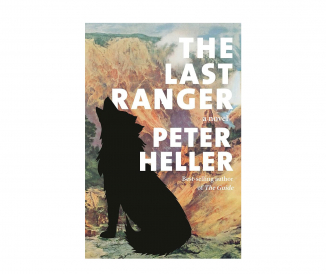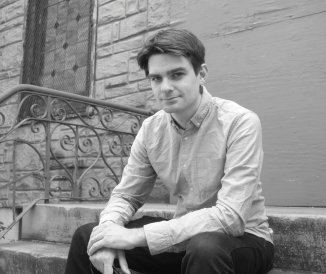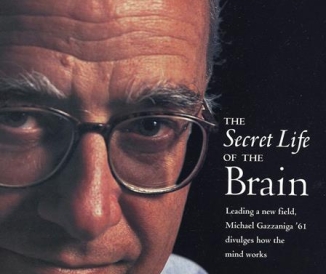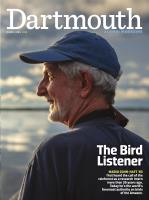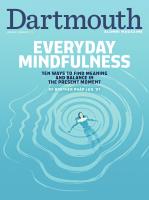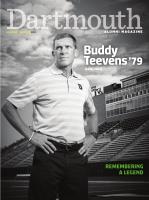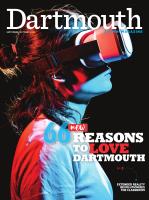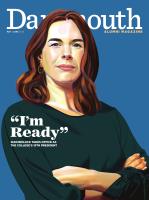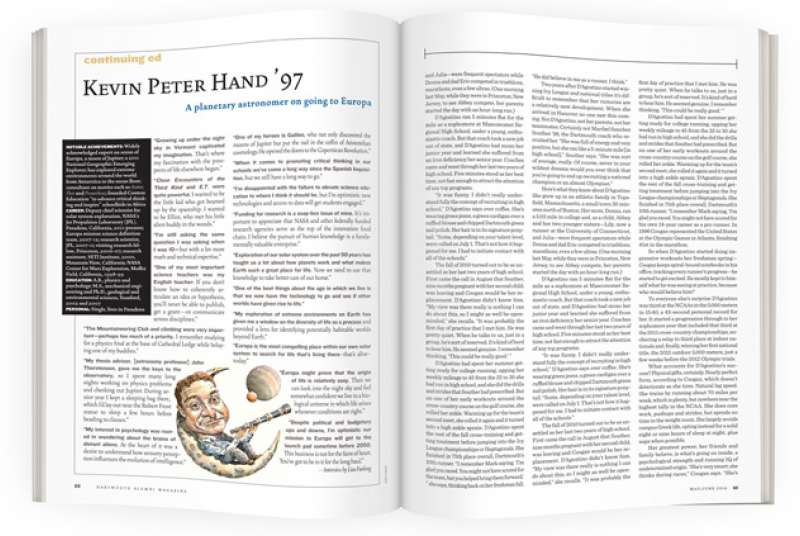
Kevin Peter Hand ’97
Notable Achievements: Widely acknowledged expert on ocean of Europa, a moon of Jupiter; a 2011 National Geographic Emerging Explorer; has explored extreme environments around the world from Antarctica to the ocean floor; consultant on movies such as Avatar, Thor and Prometheus; founded Cosmos Education “to advance critical thinking and inspire” schoolkids in Africa
Career: Deputy chief scientist for solar system exploration, NASA’s Jet Propulsion Laboratory (JPL), Pasadena, California, 2011-present; Europa mission science definition team, 2007-12; research scientist, JPL, 2007-11; visiting research fellow, Princeton, 2006-07; research assistant, SETI Institute, 2000, Mountain View, California; NASA Center for Mars Exploration, Moffet Field, California, 1998-99
Education: A.B., physics and psychology; M.S., mechanical engineering and Ph.D., geological and environmental sciences, Stanford, 2002 and 2007
Personal: Single, lives in Pasadena
“Growing up under the night sky in Vermont captivated my imagination. That’s where my fascination with the prospects of life elsewhere began.”
“Close Encounters of the Third Kind and E.T. were quite powerful. I wanted to be the little kid who got beamed up by the spaceship. I wanted to be Elliot, who met his little alien buddy in the woods.”
“I’m still asking the same question I was asking when I was 10—but with a lot more math and technical expertise.”
“One of my most important science teachers was my English teacher: If you don’t know how to coherently articulate an idea or hypothesis, you’ll never be able to publish, get a grant—or communicate across disciplines.”
“The Mountaineering Club and climbing were very important—perhaps too much of a priority. I remember studying for a physics final at the base of Cathedral Ledge while belaying one of my buddies.”
“My thesis advisor, [astronomy professor] John Thorstensen, gave me the keys to the observatory, so I spent many long nights working on physics problems and checking out Jupiter. During senior year I kept a sleeping bag there, which I’d lay out near the Robert Frost statue to sleep a few hours before heading to classes.”
“My interest in psychology was rooted in wondering about the brains of distant aliens. At the heart of it was a desire to understand how sensory perception influences the evolution of intelligence.”
“One of my heroes is Galileo, who not only discovered the moons of Jupiter but put the nail in the coffin of Aristotelian cosmology. He opened the doors to the Copernican Revolution.”
“When it comes to promoting critical thinking in our schools we’ve come a long way since the Spanish Inquisition, but we still have a long way to go.”
“I’m disappointed with the failure to elevate science education to where I think it should be, but I’m optimistic new technologies and access to data will get students engaged.”
“Funding for research is a soap-box issue of mine. It’s important to appreciate that NASA and other federally funded research agencies serve as the top of the innovation food chain. I believe the pursuit of human knowledge is a fundamentally valuable enterprise.”
“Exploration of our solar system over the past 50 years has taught us a lot about how planets work and what makes Earth such a great place for life. Now we need to use that knowledge to take better care of our home.”
“One of the best things about the age in which we live is that we now have the technology to go and see if other worlds have given rise to life.”
“My exploration of extreme environments on Earth has given me a window on the diversity of life as a process and provided a lens for identifying potentially habitable worlds beyond Earth.”
“Europa is the most compelling place within our own solar system to search for life that’s living there–that’s alive–today.”
“Europa might prove that the origin of life is relatively easy. Then we can look into the night sky and feel somewhat confident we live in a biological universe in which life arises whenever conditions are right.”
“Despite political and budgetary ups and downs, I’m optimistic our mission to Europa will get to the launch pad sometime before 2050. This business is not for the faint of heart. You’ve got to be in it for the long haul.”

